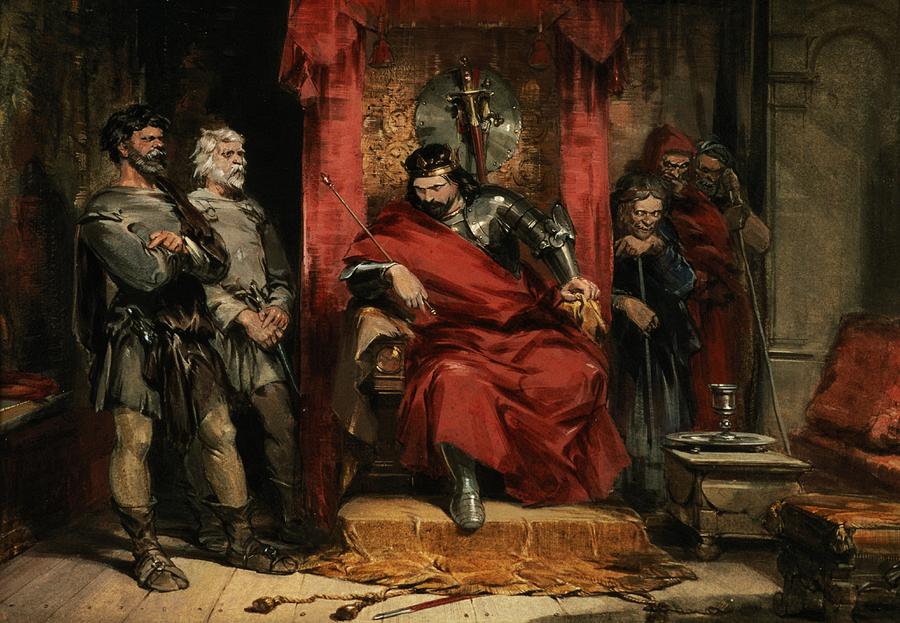Thursday
Repentant conservative Charlie Sykes invoked Shakespeare and Marlowe in a recent New York Times column as he charted the descent of the GOP, which he describes as a tragedy in four acts. Today’s post shares his parallels and adds a few more.
Sykes actually begins with Feydeau rather than Shakespeare, noting that Donald Trump’s entry into the GOP primaries has the feel of a French farce, albeit one tinged with menace. The suspense lies in “whether Republicans will bring themselves to embrace the erratic usurper.” The farce turns tragic as Trump clinches the nomination. Trump dispatches his enemies as ruthlessly as Macbeth does, with Jeb Bush standing in for Duncan and Ted Cruz, once a self-described Trump “fan,” for Banquo.
Sykes’s Act II opens with the GOP dithering like Hamlet as Trump seizes power. Speaker of the House Paul Ryan is cast in the lead role:
A solitary Hamlet-like Paul Ryan paces the stage in a torn doublet and laments the evil days that have fallen on his party; he is accompanied by a Joker (who looks a lot like Lindsey Graham) who tells him that Donald Trump is a “kook,” someone who is “not fit to run the country.” But after several long monologues, in which he rationalizes that “there is nothing either good or bad, but thinking makes it so,” the young Mr. Ryan decides that the election is a binary choice and he and other Republicans must go along.
It’s Lear rather than Hamlet who ignores the advice of his fool, but otherwise the parallel works. It’s interesting that Hamlet, when finally goaded into action, stabs the wrong man. Ryan killed moderate Polonius Republicans rather than the usurper who had poured poison into the ears of the American public:
In Act III, which depicts Trump following the election, Sykes describes Trump’s advisors as a “motley court,” bringing to mind the parody of a court that Hal and Falstaff set up when they are carousing in the inn. Both lack seriousness:
Act III opens to a scene shortly after the inauguration. One after another, Republican leaders bow the knee to the newly enthroned Orange God King, who is surrounded by a motley court of misfits, sycophants and brigands.
Just as the milder Henry IV, Part I gets darker in Part II, so does the GOP. They thought they could bend Trump to their will but instead discover that they have been Trumpified.
Actually, there is an illustrative contrast between Trump and Hal. The GOP hoped the Trump would “imitate the sun” once he stepped into office. Hal informs us that such is his intent:
Yet herein will I imitate the sun,
Who doth permit the base contagious clouds
To smother up his beauty from the world,
That, when he please again to be himself,
Being wanted, he may be more wonder’d at,
By breaking through the foul and ugly mists
Of vapors that did seem to strangle him.
Well, so much for that hope. I see no glorious victory at Agincourt on Trump’s horizon.
At this point in the drama, Sykes says, the play shifts from Shakespeare to Marlowe:
By the end of Act III, though, it is increasingly clear that this drama is less Hamlet and more Faust. It has only begun to dawn on the protagonists that in a Faustian bargain, you often get your heart’s delight, only to find out that the price was far more than you expected. (Alarms and excursions offstage.)
In Act IV we see Falstaff running the show as Trump goes all-in on pedophile Roy Moore. In this version, Hal never grows up:
Act IV opens with a solitary, dark figure, a sort of infernal Falstaff (Steve Bannon), who, despite his banishment from the White House, remains an avatar of the forces that have been unleashed by Donald Trump’s presidency. Now Mr. Bannon presents the Republican Party with its future: Roy Moore.
Sykes doesn’t have an Act V, but I’m rooting for the ending of Macbeth. People who violate all principles for the sake of power should be thrown out of office. Maybe Moore’s defeat is a sign that the Great Dunsinane Wood has begun to move.


